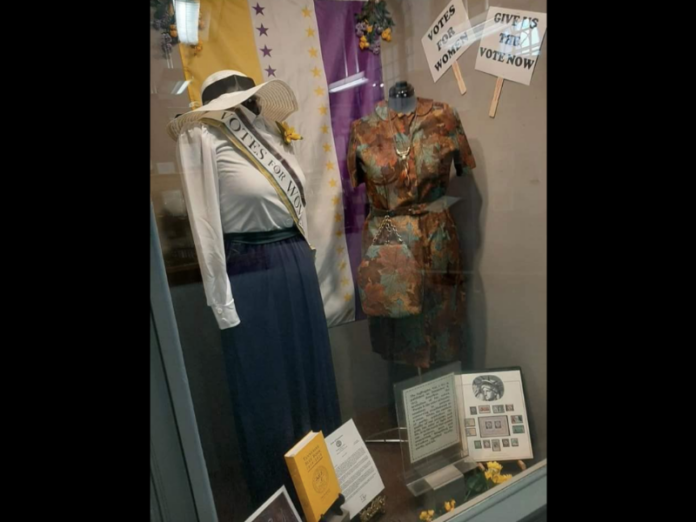On Saturday, March 4, the Robertson County History Museum will begin the celebration of Women’s History Month with their ‘Remember the Ladies’ Tea. It will be the first opportunity for the community to see their new Women’s History exhibit. The tea will also feature light refreshments, crafts, and an education box. Children and adults are welcome, and dressing up is encouraged.
Part of the exhibit will focus on Tennessee being the swing state in the ratification of the 19th Amendment giving women the right to vote. Harry Burns, the State Representative who cast the deciding vote is famous for inserting into the legislative record, “I knew that a mother’s advice is always safest for a boy to follow, and my mother wanted me to vote for ratification.”
The museum has featured “Women of Robertson County” in the past. Parts of this exhibit were collected in 2020, when the museum created an exhibit to celebrate the 100th anniversary of the ratification of the 19th Amendment. Pandemic fears minimized the number of people who were able to get out to learn about their stories. There are many women who have contributed to the rich history of the county, and the purpose of the exhibit is to highlight strong women who were members of the county’s founding families, community and civil leaders, business owners, teachers, and more.
One of the “Strong Women of the County” is featured on experiencerobertsoncounty.com, and part of the exhibit, is Lena Mae Bransford. Born to former slaves in Springfield in 1873, Bransford grew up in a highly segregated world. However, unlike many other African Americans of the time, she was highly educated and went on to get a degree from The Tennessee Agricultural and Industrial State Normal School, now Tennessee State University. She founded Bransford School when still a teenager. It was the first school for blacks in Springfield. It was a one-room schoolhouse teaching first through sixth grade. She taught for more than 60 years. Bransford Elementary School and Bransford High School were named after her, as well as Bransford Drive and Bransford Heights Housing Project.
Lydia Ann Yates Kilgore was the wife of Robertson County’s first European settler. Like many of the women who have made a difference in the past, her story is told through that of her husband. It is only in recent years that her own tale has been significantly separated from his in the files of Robertson County History. Experiencrobertson.com also features Kilgore. They describe her as, “… hard-working, courageous, and capable. She was a mother to between four and ten children and knew how to handle firearms to protect her family from the dangers that lurked in the Tennessee woods. Her and Thomas arrived in Cross Plains in 1779 with a few other families where they built a fort christened Kilgore Station, which became a focal point for immigrating into Tennessee and Robertson County.” The fort is where all settlers came when there was an attack, which forced her to be the “den mother” for all of the other women and children. A position she initially rejected when her husband decided to uproot the family and move to the wilds of Tennessee, but she rose to the occasion and lived to be 84 years old in spite of the harsh conditions.
Lousia Christine Rolfing Nelson took over Nelson’s Green Briar Tennessee Whiskey after her husband died unexpectedly at a time when women couldn’t even vote. Experiencerobertson.com goes on to say, “All eyes were on Louisa as she took her place at the helm of the company, expected to make decisions about securing capital, national distribution, distilling techniques, and more… Louisa not only met expectations, she exceeded them. Under her leadership, Nelson’s continued its production capacity of 380,000 gallons of whiskey and spirits each year (Jack Daniel’s was only producing 23,000 gallons) and began distributing as far away as Europe and the Philippines. Her own ambition and shrewd business sense allowed Nelson’s to become one of the largest and most successful distilleries in the world. Even as a successful executive, Louisa was a dedicated single mother, tending to her household, raising her six children, and equally supporting both her sons and daughters as they attended college.” Prohibition passed in Tennessee in 1909, closing down the distillery. It has since been resurrected by descendants in Nashville.
The Robertson County Historical Society was organized in 1967 and is a nonprofit corporation under section 501(c)(3) of the Internal Revenue Code. The chief purpose of the Museum is to collect and preserve items of historical importance to Robertson County, Tennessee. Other objectives are: to provide educational and entertaining exhibits, programs and activities for its citizens of all ages; to provide a learning center on Robertson County History for students in area schools; to provide a source for research in cooperation with Stokes Brown Public Library, Robertson County Archives, Robertson County Courthouse and Springfield City Hall; to provide an outlet for publications of the Robertson County Historical Society.
Admission to the tea is $10. To purchase tickets, click here.



























